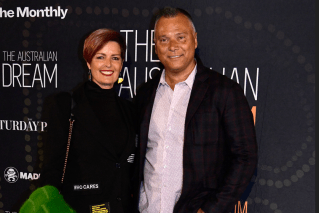Please stop: Here’s why ‘I love you’ is getting way out of control


One out of 10 Australians say "I love you" in the first week of meeting a new romantic interest. Photo: Getty
I love you, dear reader. Sure, I don’t really know you, but that’s not the point. I’m on trend.
A cluster of research from over the past decade suggests that saying “I love you” has turned into a mad, meaningless compulsion.
Apparently, according to an astonishingly detailed study in the International Journal of Society, Culture & Language, 18 per cent of Americans say “I love you” to their shoes.
Nearly one in four say it to their electronic devices.
And one in five, when saying those reckless words, aren’t conveying affection, passion or even appreciation. What they mean by it is: “I need something.”
While 43 per cent say it in the stead of “I apologise for what I have done.”
OK, we’ve all been there, right?
From an old romantic’s point of view, it’s almost a relief that survey of 2000 people – by dating site eharmony – found one in 10 Australians say “I love you” just one week after meeting. Overall, 69 per cent of Australians say it within three months of establishing a new relationship.
Which is all very good, but they just keep on saying it.
According to eharmony’s report: “Loved-up couples say ‘I love you’ up to eight times a week, which illustrates that the phrase has evolved beyond being a declaration of feelings and perhaps become part of everyday conversation both on and offline.”
(The site eharmony, by the way, is the dating site where you spend years filling out a profile questionnaire that eventually gets abandoned, unfinished, unless you love that sort of thing.)

Don’t feel shy about saying “I love you” to your car. It’s in the mainstream now. Photo: Getty
The Chinese and US researchers behind the International Journal of Society, Culture & Language study found one in 10 people say “I love you” more than 10 times a day, and one in four say it more than five times a day.
This suggest those three tired words have become more a social lubrication.
Nearly 80 per cent of people say it at the end of a phone call, 12 per cent say it while shopping and 2 per cent say it to service providers, such as the weary, no-nonsense, call centre slave working on behalf of the electricity company.
As psychologist and social commentator Lyn Bender points out, there was a time – “in Jane Austen’s day” – when “I love you” was a serious matter.
“You were declaring your intentions. ‘I’m going to marry you,’ and you would proceed from there,” Ms Bender said.
“When it’s said now, especially in the first week of meeting someone, sometimes it’s said as an attempt to make the person feel more committed to you.
“Or it can be used as a seduction tool. I’m not just on the make, I love you, I’m sticking around.”
In fact, 37 per cent of millennials say it for the first time in bed compared to 12 per cent of baby boomers.
And then, more often than not, once the deed is done, the love magically vanishes.
“I’m not saying that a strong attraction early in the piece may not be a precursor to a very long-lasting relationship,” Ms Bender said.
“There are many times you see something in someone that’s actually there.
“At the same time, in the early stages of meeting someone, you can take an intense dislike to them and then later find they’re not so bad.
“Overall, either way, it’s a superficial connection. You’re seeing what you want to see. You mistake them for your dream person because they resemble your dream person. I love you, I love you. But it’s all pretty much on the surface and often quite erotic.”
Ms Bender says she’s no longer sure what people mean when they say it.
“For different people, it has a range of meanings. Is it more meaningful for someone to say ‘I really care for you and I’d like to get to know you’ or ‘I feel hopeful we could have a longer-term relationship’. That might have more truth in it than a bland I love you.”
She wonders, though, if the love you virus is a consequence of generational change and payback.
“People are realising that their parents never said I love you. It wasn’t seen in the family and they want to remedy that and say it more. So it could be a generational thing, maybe that’s part of it.”








